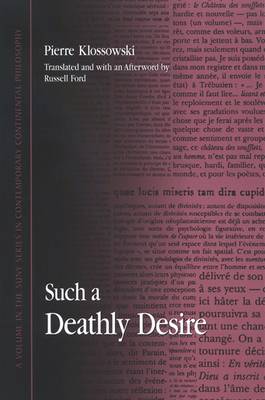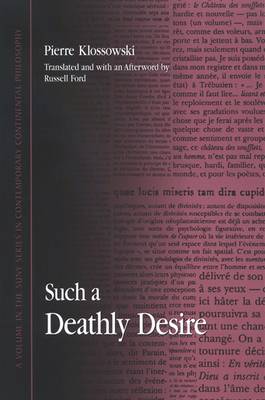
- Afhalen na 1 uur in een winkel met voorraad
- In januari gratis thuislevering in België
- Ruim aanbod met 7 miljoen producten
- Afhalen na 1 uur in een winkel met voorraad
- In januari gratis thuislevering in België
- Ruim aanbod met 7 miljoen producten
Omschrijving
Provocative essays on language, literature, and the aesthetics of embodiment.
Shocking, brilliant, and eccentric, the French author, translator, and artist Pierre Klossowski (1905-2001) exerted a profound effect on French intellectual culture throughout the twentieth century. The older brother of the painter Balthus, secretary to the novelist André Gide, friend to Georges Bataille and Maurice Blanchot, and heralded as one of the most important voices in the French "return to Nietzsche" by Michel Foucault and Gilles Deleuze, Klossowski pursued his singular vision of mortal embodiment through a variety of scholarly manifestations. In Such a Deathly Desire (Un si funeste désir), Klossowski's original interpretation of Nietzsche's eternal return is developed around the enigmatic figure of the "demon," then deepened with provocative readings of Gide's correspondence; Barbey d'Aurevilly's novel A Married Priest; and the intertwining of language and death in the work of Bataille, Blanchot, and Brice Parain. The book concludes with the powerful essay "Nietzsche, Polytheism, and Parody," in which Klossowski articulates the consequences of the eternal return and the meaning of Nietzsche's genealogy of the fabulation of the world. Intersecting with and confounding a range of disciplines-including psychoanalysis, literary criticism, gender studies, and philosophy-Klossowski's critical writings on language, literature, and the aesthetics of embodiment remain powerful and original contributions to contemporary concerns in the theoretical humanities.
Specificaties
Betrokkenen
- Auteur(s):
- Vertaler(s):
- Uitgeverij:
Inhoud
- Aantal bladzijden:
- 162
- Taal:
- Engels
- Reeks:
Eigenschappen
- Productcode (EAN):
- 9780791471968
- Verschijningsdatum:
- 9/08/2007
- Uitvoering:
- Paperback
- Formaat:
- Trade paperback (VS)
- Afmetingen:
- 152 mm x 228 mm
- Gewicht:
- 226 g

Alleen bij Standaard Boekhandel
Beoordelingen
We publiceren alleen reviews die voldoen aan de voorwaarden voor reviews. Bekijk onze voorwaarden voor reviews.









